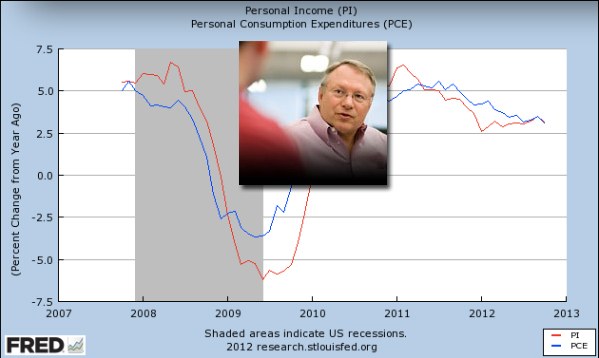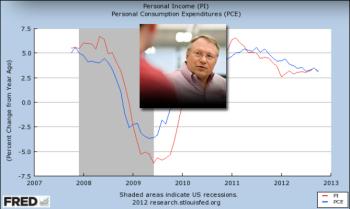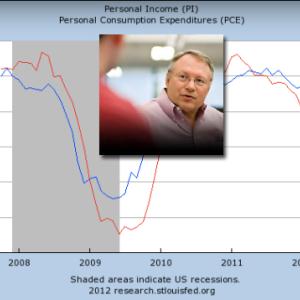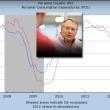John Davidson's Economic Comments
Mon, 12/03/2012 - 12:15pm
Economic releases for October in the US have been difficult to analyze due to the impact Hurricane Sandy; but, even so, these releases were overshadowed by fiscal cliff posturing by the partisan administration and congressional jesters. European releases continued to be soft. Surprisingly, both the stock and bond markets managed to post positive gains and credit spreads narrowed. WTI gained, but other energy and metals prices declined. The US dollar finished the week higher against the Pound, Looney, and Yen, but declined against the Euro.
Perspective: Making decisions based on the likely outcome of the negotiations in Washington to avoid the fiscal cliff is a losing game. The markets have priced in some probability of a compromise, but if negotiations fail the markets will fall and they it succeed, the markets will rise. This is a bet on red or black in which those on the wrong side will loose and those on the right side will win. Yet, in either case, everyone is losing by this focus on a single factor. What are we missing? We don't know. For example, this week Josh Mitchell's article in the WSJ, Federal Student Lending Swells, alerted readers to the increasing default rates of Federal student loans. Josh reported that, in September, one in nine loans were 90 days or more delinquent; in the past few years student loan delinquency rates have risen at a time when the delinquency rates for other consumer loans have fallen. Furthermore, student loan delinquency rates now exceed those of credit cards, mortgages, home equity, and automobiles. As of the end of the 3rd quarter, the outstanding Student Loan debt of $956 billion exceeded outstanding debt for the other consumer loans. Guess who stands behind student loans... The idea of Federal support for education is a laudable one, allowing everybody to get a college education. The GI bill at the end of WW II allowed a generation of GI's to get an education and helped to spur decades of economic growth. Yet, sometimes there are unintended consequences. The increase in government aid has allowed colleges to increase their tuition and fees for room and board. In fact, Colleges have needed to increase their fees to keep up with their rising costs. Having taken 5 of our children on college tours I have seen the 1st class athletic facilities, libraries, and dorm rooms necessary to attract the best applicants. College tuition and fees have increased more than the overall rate of inflation. As a benchmark for the increasing costs of education I can relate to a conversation I had in the mid-1970's with my boss who was heavily involved as an alumni of MIT. He reported that MIT had kept the total annual cost (tuition, room, & board) of attending MIT equal to the cost of a modest mid-size family car. Today's annual cost of attending a private college would buy a well-equipped Lexus or other high end car. Both my wife and our son utilized student loans. So, I am supportive of the benefit of student loans; but, I am also concerned that we are heading down the path carved out by sub-prime home loans. We know where that led! |
| Other Economic Releases
In the US, New Orders for Durable Goods were also flat in October; ex-transporation, Orders rose 1.5% in October. On the positive side, 3rd quarter GDP was revised higher to 2.7%, a tick below consensus; yet, behind the numbers the upward revision was driven by increases in inventory, a component that may detract from future growth. As a precursor to next week's Purchasing Managers reports, the Chicago PMI crossed into the expansion zone to 50.4 in November. The week of November 24th, Jobless Claims declined to 393,000, but the 4-week average increased to 405,250. In the European Union, Economic, Industrial, and Consumer Sentiments were little changed in October with the latter two a little better and the third a little worse. EU Unemployment ticked up to 11.7% in October. German Unemployment remained unchanged at 6.9% in November. German Retail Sales fell -2.8% in October. UK's 3rd quarter remained unchanged at 1.0%, a -0.1% decline from a year ago. China's DFLP Manufacturing Purchasing Managers Index rose to 50.6 in November; China's official Services PMI rose to 55.6. |
Equity markets added hesitantly to last week's gains in hopes that an agreement to avoid the fiscal cliff would emerge to spur stock prices higher.

Bond Markets:
In an unusual move, bond markets gained (in price) while stock markets edged higher. Credit spreads declined providing the best returns in the spread markets.

Currencies & Commodities:
The US Dollar was slightly better on the week; It gained on the Yen, Pound, and Looney, but lost value against the Euro. WTI rose, but other energy and metals commodity prices declined.

Data Source: Bloomberg Applications for I-Phone and I-Pad

John W. Davidson, CFA
jwdbond@gmail.com
207-701-1321
Event Date
Address
United States
Standard Post




























